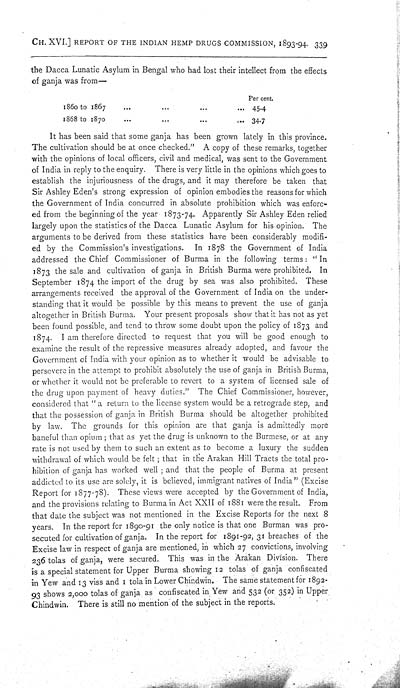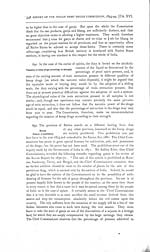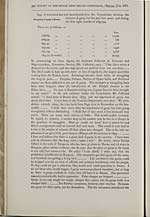Medicine - Drugs > Report of the Indian Hemp Drugs Commission, 1894-1895 > Volume I
(374) Page 339
Download files
Individual page:
Thumbnail gallery: Grid view | List view

CH. XVI.] REPORT OF THE INDIAN HEMP DRUGS COMMISSION, 1893-94. 339
the Dacca Lunatic Asylum
in Bengal who had lost their intellect from the effects
of ganja was from—
|
Per cent. |
|
|
1860 to 1867 |
45.4 |
|
1868 to 1870 |
34.7 |
It has been said that
some ganja has been grown lately in this province.
The cultivation should be at once checked." A copy of these
remarks, together
with the opinions of local officers, civil and medical, was sent to
the Government
of India in reply to the enquiry. There is very little in the
opinions which goes to
establish the injuriousness of the drugs, and it may therefore be
taken that
Sir Ashley Eden's strong expression of opinion embodies the reasons
for which
the Government of India concurred in absolute prohibition which was
enforc-
ed from the beginning of the year 1873-74. Apparently Sir Ashley
Eden relied
largely upon the statistics of the Dacca Lunatic Asylum for his
opinion. The
arguments to be derived from these statistics have been
considerably modifi-
ed by the Commission's investigations. In 1878 the Government of
India
addressed the Chief Commissioner of Burma in the following terms:
"In
1873 the sale and cultivation of ganja in British Burma were
prohibited. In
September 1874 the import of the drug by sea was also prohibited.
These
arrangements received the approval of the Government of India on
the under-
standing that it would be possible by this means to prevent the use
of ganja
altogether in British Burma. Your present proposals show that it
has not as yet
been found possible, and tend to throw some doubt upon the policy
of 1873 and
1874. I am therefore directed to request that you will be good
enough to
examine the result of the repressive measures already adopted, and
favour the
Government of India with your opinion as to whether it would be
advisable to
persevere in the attempt to prohibit absolutely the use of ganja in
British Burma,
or whether it would not be preferable to revert to a system of
licensed sale of
the drug upon payment of heavy duties." The Chief Commissioner,
however,
considered that "a return to the license system would be a
retrograde step, and
that the possession of ganja in British Burma should be altogether
prohibited
by law. The grounds for this opinion are that ganja is admittedly
more
baneful than opium; that as yet the drug is unknown to the Burmese,
or at any
rate is not used by them to such an extent as to become a luxury
the sudden
withdrawal of which would be felt; that in the Arakan Hill Tracts
the total pro-
hibition of ganja has worked well; and that the people of Burma at
present
addicted to its use are solely, it is believed, immigrant natives
of India" (Excise
Report for 1877-78). These views were accepted by the Government of
India,
and the provisions relating to Burma in Act XXII of 1881 were the
result. From
that date the subject was not mentioned in the Excise Reports for
the next 8
years. In the report for 1890-91 the only notice is that one Burman
was pro-
secuted for cultivation of ganja. In the report for 1891-92, 31
breaches of the
Excise law in respect of ganja are mentioned, in which 27
convictions, involving
236 tolas of ganja, were secured. This was in the Arakan Division.
There
is a special statement for Upper Burma showing 12 tolas of ganja
confiscated
in Yew and 13 viss and 1 tola in Lower Chindwin. The same statement
for 1892-
93 shows 2,000 tolas of ganja as confiscated in Yew and 532 (or
352) in Upper
Chindwin. There is still no mention of the subject in the
reports.
Set display mode to: Large image | Zoom image | Transcription
Images and transcriptions on this page, including medium image downloads, may be used under the Creative Commons Attribution 4.0 International Licence unless otherwise stated. ![]()
| India Papers > Medicine - Drugs > Report of the Indian Hemp Drugs Commission, 1894-1895 > Volume I > (374) Page 339 |
|---|
| Permanent URL | https://digital.nls.uk/74574814 |
|---|---|
| Description | Chapter XVI, cont. |
| Description | [Volume 1]: Report. |
|---|---|
| Attribution and copyright: |
|




